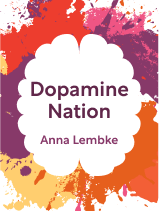

This article is an excerpt from the Shortform book guide to "Dopamine Nation" by Anna Lembke. Shortform has the world's best summaries and analyses of books you should be reading.
Like this article? Sign up for a free trial here.
What is one of the biggest problems we face in society? How has abundance become an issue?
Checking social media, eating junk food, or binging shows and movies on streaming platforms are some of the potentially addictive behaviors created by abundance in industrial society, according to addiction expert Anna Lembke. In her book, Dopamine Nation, she explores how to defeat an abundance mentality.
Read on to learn why abundance leads to overindulgence and the solution to an abundance mentality, according to Lembke.
Abundance Mentality in Society
In Dopamine Nation, Stanford University psychiatrist and addiction treatment expert Anna Lembke argues that addiction is just an extreme form of a universal problem: the compulsive pursuit of neurochemical rewards at the expense of your own happiness. According to Lembke, industrial society creates an abundance mentality—people in industrialized nations now experience an abundance of food, entertainment, narcotics, and other pleasure-inducing goods.
The intense motivation to seek neurochemical rewards that served your ancestors so well now leads to overconsumption—your brain still behaves as if you could run out of these pleasurable goods at any moment, and encourages a cycle of addiction.
Lembke further explains that leisure time provides opportunities for overconsumption. In industrial societies, survival requires less daily effort: You no longer have to gather food all day or move every time there’s a drought. The consequent increase in leisure time creates opportunities for an abundance mentality involving compulsive consumption—when you don’t have to spend your time on basic survival, you can redirect that time to pleasurable activities. Hunter-gatherers didn’t have time to play video games all day, but people in industrial societies often do.
| When Does Free Time Make People Unhappy? Lembke draws a clear link between excess leisure time and overindulgence. She also suggests this may be a cause for rising unhappiness in industrialized nations. However, psychological research shows that leisure time by itself doesn’t necessarily decrease human flourishing. Understanding how much free time to have and how to use your free time well may prevent you from falling into overindulgence. Studies have revealed a kind of “goldilocks zone” of free time that increases happiness. Fewer than two hours of free time per day makes people less happy—but so does more than five hours. Between two and five hours seems like the optimal range. That said, using excess free time wisely can mitigate its ill effects. Filling your excess free time with meaningful hobbies or socializing can make you much happier than activities that feel hollow, repetitive, or lonely, such as the repetitive consumption of abundantly pleasurable goods like social media or junk food. |
Does Abundance Create Indulgence?
Lembke contends that the overabundance found in industrial societies creates opportunities to compulsively overindulge. In other words, she says, greater supply leads to greater demand. However, some would disagree with this concept of an abundance mentality. The economist John Maynard Keynes rejected the idea that supply could create demand. He argued that if people desired things simply because they were abundant, then businesses could make money by producing anything they wanted—there would always be a market for their products. He contended that businesses are only profitable when they produce supply in response to the consumer demand that already exists.
That said, Lembke’s position has strong advocates as well. David T. Courtwright (The Age of Addiction) argues that demand for addictive goods such as alcohol and cigarettes doesn’t follow the demand-before-supply model perfectly. Companies that sell addictive goods have an incentive to promote an abundance mentality, trying to get customers “hooked” on their products by making these products easily available. The greater the supply, the easier it is to get a “first dose” into the hands of prospective consumers.
For example, when alcohol companies sponsor sporting events, concerts, and festivals, their goal is to make their brand of alcohol abundant and easily accessible so that people will try it—and eventually, become addicted. He argues that through these strategies, businesses are able to leverage the abundant supply of their addictive goods to create future demand for their products.
Overindulgence in Industrial Society
According to Lembke, your brain is fine-tuned to keep consuming pleasurable goods—and now you have an abundance of these goods and plenty of time to consume them. Lembke asserts that the rising abundance mentality is behind a well-documented decrease in happiness among industrialized societies, and she highlights the rise in addiction-related deaths in all age groups between 1990 and 2017.
Even if the odds are stacked against you, it’s still possible to overcome your patterns of overindulgence. However, you’ll have to tackle the cycle in both its dimensions: neurochemical and emotional. Throughout the rest of this guide, we’ll explore both angles—for each, we’ll first discuss the obstacles to changing your habits, then walk through Lembke’s solutions.
The Solution to Overindulgence
Lembke provides a solution to defeating the cycle of abundance and overindulgence that industrial society provides. She suggests reinforcing the connection between your prefrontal cortex and your brain’s reward pathways through deliberate use of your prefrontal cortex. She advises you to make an effort to think about your future. Lembke found that just thinking about what you want your life to look like 10 years down the road activates your prefrontal cortex, helping you gain perspective and find motivation to change your abundance mentality.
| Prioritizing Long-Term Rewards Lembke recognizes the challenge of prioritizing long-term rewards in industrial society, which values instant gratification. She suggests practicing using your prefrontal cortex so that you gradually develop a stronger capacity for long-term thinking. However, this solution only yields results after a significant time investment. Dan Ariely (Predictably Irrational) offers some practical solutions for prioritizing long-term rewards that you can start applying immediately. 1. Make pre-commitments. When building habits, commit to things that are hard to back out of. If you’re committing to abstaining from pleasure, you can create accountability by doing it with a friend. 2. Minimize distractions. Create an environment that limits your access to distractions. If your attention is constantly being pulled in new directions, it’s easier to lose focus and fall back into automatic behaviors. 3. Reward yourself. You can reinforce the behaviors that are most important to you by tying them to a reward. If you’re cutting back on social media, set a weekly goal and treat yourself with a meal out if you achieve it |

———End of Preview———
Like what you just read? Read the rest of the world's best book summary and analysis of Anna Lembke's "Dopamine Nation" at Shortform.
Here's what you'll find in our full Dopamine Nation summary:
- What causes addictive behaviors and how to take back control
- How pleasure and pain motivate you to consume
- Strategies for keeping your brain’s natural chemicals in balance






